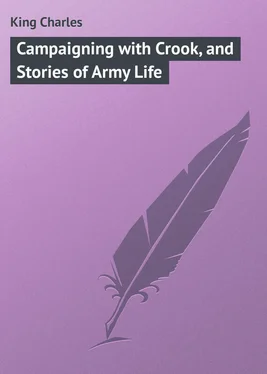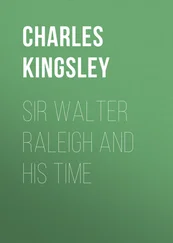Charles King - Campaigning with Crook, and Stories of Army Life
Здесь есть возможность читать онлайн «Charles King - Campaigning with Crook, and Stories of Army Life» — ознакомительный отрывок электронной книги совершенно бесплатно, а после прочтения отрывка купить полную версию. В некоторых случаях можно слушать аудио, скачать через торрент в формате fb2 и присутствует краткое содержание. Жанр: foreign_prose, на английском языке. Описание произведения, (предисловие) а так же отзывы посетителей доступны на портале библиотеки ЛибКат.
- Название:Campaigning with Crook, and Stories of Army Life
- Автор:
- Жанр:
- Год:неизвестен
- ISBN:нет данных
- Рейтинг книги:5 / 5. Голосов: 1
-
Избранное:Добавить в избранное
- Отзывы:
-
Ваша оценка:
- 100
- 1
- 2
- 3
- 4
- 5
Campaigning with Crook, and Stories of Army Life: краткое содержание, описание и аннотация
Предлагаем к чтению аннотацию, описание, краткое содержание или предисловие (зависит от того, что написал сам автор книги «Campaigning with Crook, and Stories of Army Life»). Если вы не нашли необходимую информацию о книге — напишите в комментариях, мы постараемся отыскать её.
Campaigning with Crook, and Stories of Army Life — читать онлайн ознакомительный отрывок
Ниже представлен текст книги, разбитый по страницам. Система сохранения места последней прочитанной страницы, позволяет с удобством читать онлайн бесплатно книгу «Campaigning with Crook, and Stories of Army Life», без необходимости каждый раз заново искать на чём Вы остановились. Поставьте закладку, и сможете в любой момент перейти на страницу, на которой закончили чтение.
Интервал:
Закладка:
From that night "Officer's Call" grew to be the conventional signal by which we of the Fifth were wont to herald our coming through the darkness or distance to comrades who might be awaiting us. Last September, when the Utes made their attack on Major Thornburgh's command, your readers will doubtless remember that after that gallant soldier's death the command of the besieged battalion devolved upon Captain Payne, of the Fifth Cavalry. He and his company, who were the first to employ the signal, have best reason to remember its subsequent value, and I cannot do better than to repeat in his own words, my classmate's description of the arrival of General Merritt and the regiment after their famous dash of two hundred miles to the rescue. Of his little battalion of three companies, fifty were lying wounded in the hurriedly constructed rifle-pits, he and his surgeon were of the number, and for six days the Indians had poured in a pitiless fire whenever hand or head became visible. Hoping for the speedy coming of his colonel, Payne tells us: "While lying in the trenches on the night of the 4th of October, this incident came to mind. Believing it just possible for General Merritt to reach us next morning, and knowing that, if possible, come he would, I directed one of my trumpeters to be on the alert for the expected signal. And so it was; just as the first gray of the dawn appeared, our listening ears caught the sound of "Officer's Call" breaking the silence of the morning, and filling the valley with the sweetest music we had ever heard. Joyously the reply rang out from our corral, and the men rushing from the rifle-pits made the welkin ring with their glad cheers."
First at the head-waters of the Mina Pusa, in July, '76; last in the valley of the Milk River. Next? Far out in the cañons of Colorado, utterly isolated from the world, snowed in, living we don't know how, four companies of the Fifth Cavalry are waiting at the ruins of the White River Agency the result of all this negotiation in Washington. Merritt with the other companies, six in number, is wintering at Fort Russell, on the line of the Union Pacific. More than probable is it that the earliest spring will find him a second time making that two-hundred-mile march to the Milk River, and once again the Rockies will echo the stirring strains of "Officer's Call."
Saturday, the 29th of July, '76, broke like a morning in mid-Sahara. We marched in glaring sun, through miles of dust, sage-brush, and alkali, and followed it up on Sunday, the 30th, with just such another; no shade, no grass, no water fit to swallow. We bivouacked along the Powder River, a curdling stream the color of dirty chalk, and we gazed with wistful, burning eyes at the grand peaks of the Big Horn, mantled with glistening snow, only fifty miles away. Monday was another day of heat, glare, and dust, with that tantalizing glory of ice and snow twenty miles nearer. That night the wind started in from the west, and blew down from those very peaks, fanning our fevered cheeks like blessed wavelets from heaven, as indeed they were. We were gasping for air on the banks of Crazy Woman's Fork, and would have suffocated but for that glad relief.
Early next morning Merritt led us on again, marching through a rolling country that became more and more varied and interesting with every mile; we were edging in closer to the foot-hills of the mountains. Several small herds of buffalo were sighted, and some few officers and men were allowed to go with Cody in chase. At one p.m. we halted on Clear Fork, a beautiful running stream deserving of its name, fresh from the snow peaks on our left; had lunch and rested until five, when once more we saddled up and pushed ahead; came suddenly upon Lake De Smet, wild and picturesque, lying like a mirror in a deep basin of treeless banks, and in a beautiful open glade, rich with abundant green grass and watered by a clear, cold rivulet, we camped in the glorious starlight, thanking Heaven we were out of the desert, and at last along the storied range of the Big Horn.
Wednesday, August 2d, dawned bracing, clear, and beautiful. The glorious sunshine beamed on lofty crags and pine-covered heights close at our left hand, peered into dark ravine and rocky gorge, sparkled on the swift-flowing stream, and on innumerable dew-drops over the glade. Men and horses awoke to new life. A few miles ahead lay a lofty ridge, and from that, said our guides, the valleys of the Tongue and its branches, and the grand sweep of country towards the Rosebud on the north, and the Big Horn River to the northwest, would be spread before us like a map. Over that ridge, somewhere, lies Crook with his force, expectant of our coming; over that ridge, beyond him, are or were ten thousand renegades and hostile Indians, Sioux, and San Arcs, Cheyennes of the North (it was the Southern Cheyennes we whipped back on the War Bonnet), Minneconjous, Uncapapas (Sitting Bull's Own), Yanktonnais, and Brulés, all banded together in one grand attempt to exterminate the white intruders.
How I envied the advance that day the first glimpse over that divide! But each company took its turn at head of column; and now that we were fairly in among the fastnesses, where attack might be expected at any moment, two companies were daily detailed to escort and guard the wagon train, and Companies "A" and "K" were the unfortunates to-day. It was mean duty. The road was not bad, but it wound up and down, over crests and through deep ravines. We had to dismount and lend a helping hand half the time. At seven we passed the palisaded ruins of old Fort Phil Kearney, abandoned by "Peace Commission" order in '68; and just beyond we halted and silently surveyed the ridge on which Captains Fetterman and Brown, Lieutenant Grummond, and three companies of soldiers were slowly slaughtered by Red Cloud and his surrounding thousands in December, '66. We fancied the poor women and children in the fort, listening and looking on in dumb, helpless horror; and then we thought of Custer and his comrades lying yet unburied only a few miles farther across that uplifted barrier in our front, and then we hurried on, eagerly praying that it might be our fortune to avenge some of those sacrificed lives; toiled up the long, long ascent, reached the lofty crest, and halted again in sheer amaze. The whole landscape to the north was black with smoke. East, as far as the Cheetish (Wolf) Mountains; west, as far as the Little Horn, from every valley great masses of surging, billowy clouds rolled up to swell the pall that overspread the northern sky and hung low upon the dividing ridges towards the Yellowstone. Here and there forked flames shot up through the heated veil, and even at our distance we could almost hear their roar and crackle. "Lo" had set the country afire to baffle his pursuers, and, knowing of the coming of Crook's reinforcements, was now, in all probability, scattering over the continent.
At eleven we passed an abandoned outpost of earthworks – thrown up, probably, by a detached company guarding the road. At two we overtook Merritt and the eight companies resting along a cool, limpid stream that gave promise of trout; and here we camped for the night, and listened eagerly to the news brought us by courier from General Crook. Scouts were out hunting for the Indians, who had withdrawn their masses from his immediate front, and he was only waiting our coming to launch out in pursuit. We sleep that night restless and impatient of the delay – morning comes all too slowly – but at four o'clock we are astir and on the move to meet our brigadier, but couriers report him coming down towards us along the main valley of the Tongue. We unsaddle and wait till three in the afternoon, when again "the General" sounds, and we march northwardly over the ridges towards the thick smoke. "Crook is camping on Goose Creek," is the explanation, and we are to join him there. At half-past five we catch glimpses of distant patrols and herds of cavalry horses and quartermasters' mules on the sloping side-hills. Presently horsemen come cantering out to meet us. Gray-haired, handsome, soldierly as ever, the first to hail us is our old Arizona major, now Lieutenant-Colonel Royall, of the Third Cavalry – with him a group of his own and the Second Cavalry officers. But we are still moved onward. We descend a long spur of foot-hill; plunge through a rapid mountain torrent into dense timber on the other side, still guided by our welcoming comrades; ride with dripping flanks through willow and cottonwood into brilliant light beyond. There white tent and wagon-covers gleam in every direction; rough, bearded men are shouting greeting; and just ahead, on the trail, in worn shooting-jacket, slouch felt hat, and soldier's boots, with ragged beard braided and tied with tape, with twinkling eyes and half-shy, embarrassed manner, stands our old Arizona friend and chieftain, the hardworking soldier we have come all these many miles to join, looking as natural as when we last saw him in the spurs of the Sierras. There is no mistaking the gladness of his welcome. His face lights up with new light. He has a cordial word with General Carr, who commands the leading battalion; then turns to me, and with a grasp of the hand that fairly makes me wince, gives greeting for which I'd make that march twice over.
Читать дальшеИнтервал:
Закладка:
Похожие книги на «Campaigning with Crook, and Stories of Army Life»
Представляем Вашему вниманию похожие книги на «Campaigning with Crook, and Stories of Army Life» списком для выбора. Мы отобрали схожую по названию и смыслу литературу в надежде предоставить читателям больше вариантов отыскать новые, интересные, ещё непрочитанные произведения.
Обсуждение, отзывы о книге «Campaigning with Crook, and Stories of Army Life» и просто собственные мнения читателей. Оставьте ваши комментарии, напишите, что Вы думаете о произведении, его смысле или главных героях. Укажите что конкретно понравилось, а что нет, и почему Вы так считаете.












